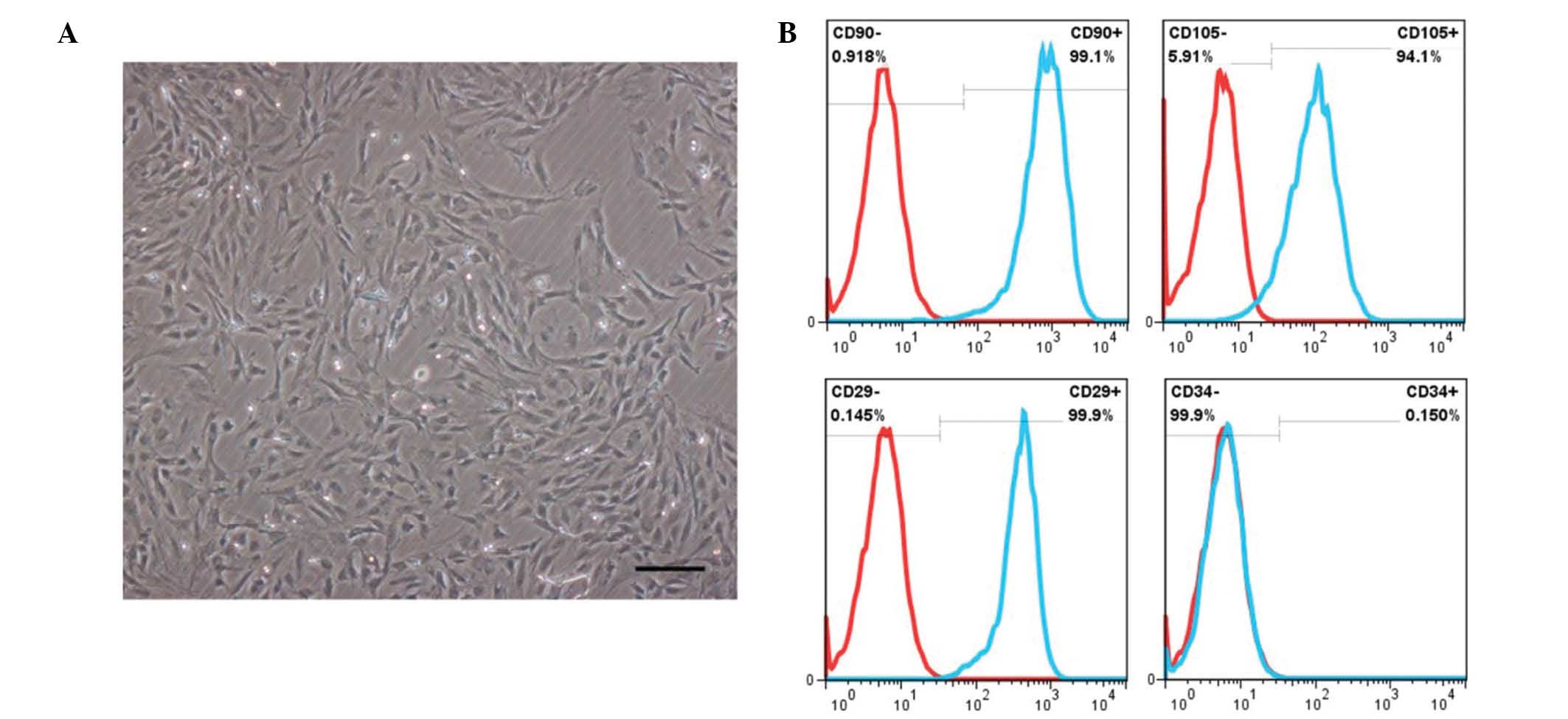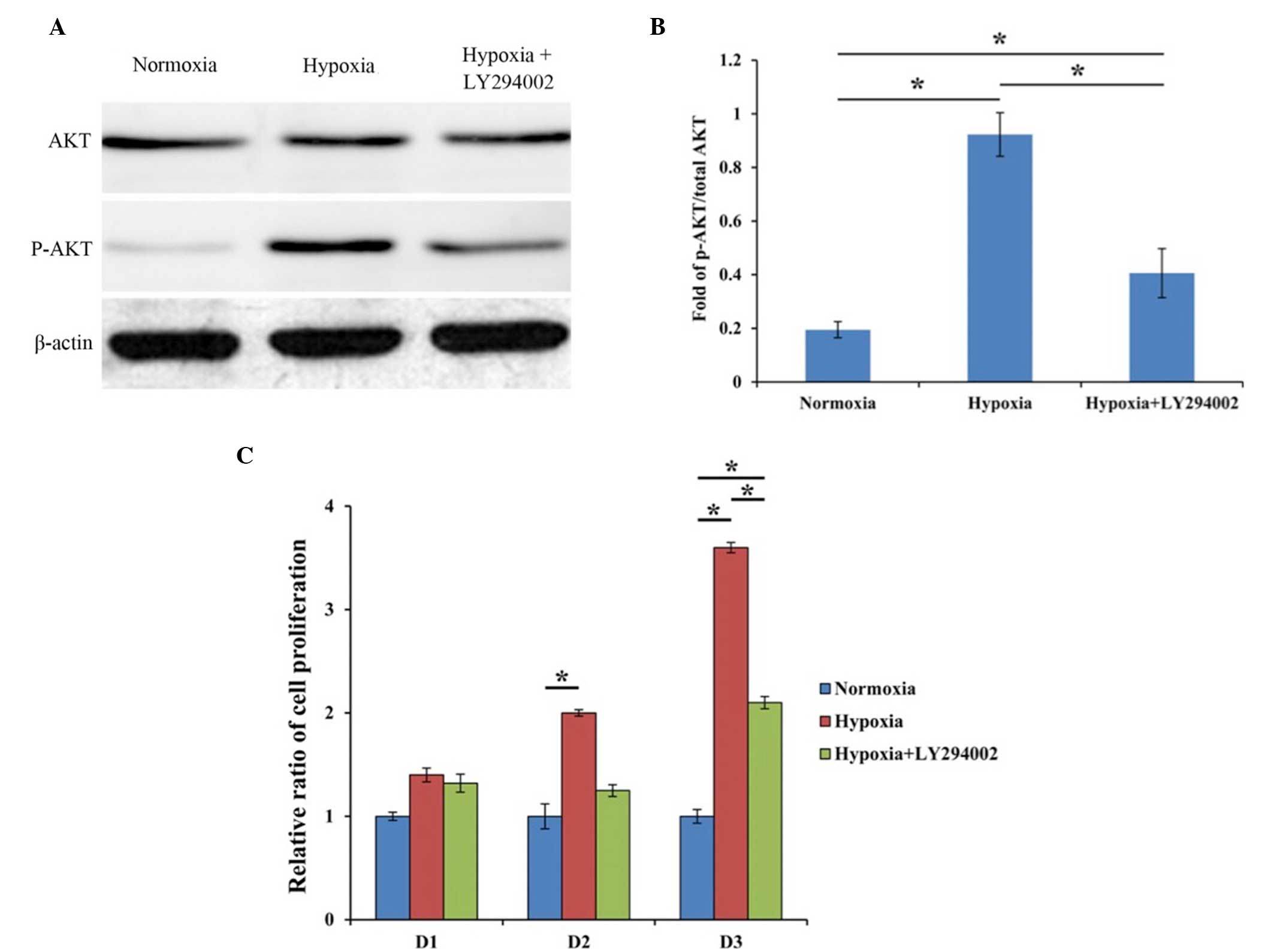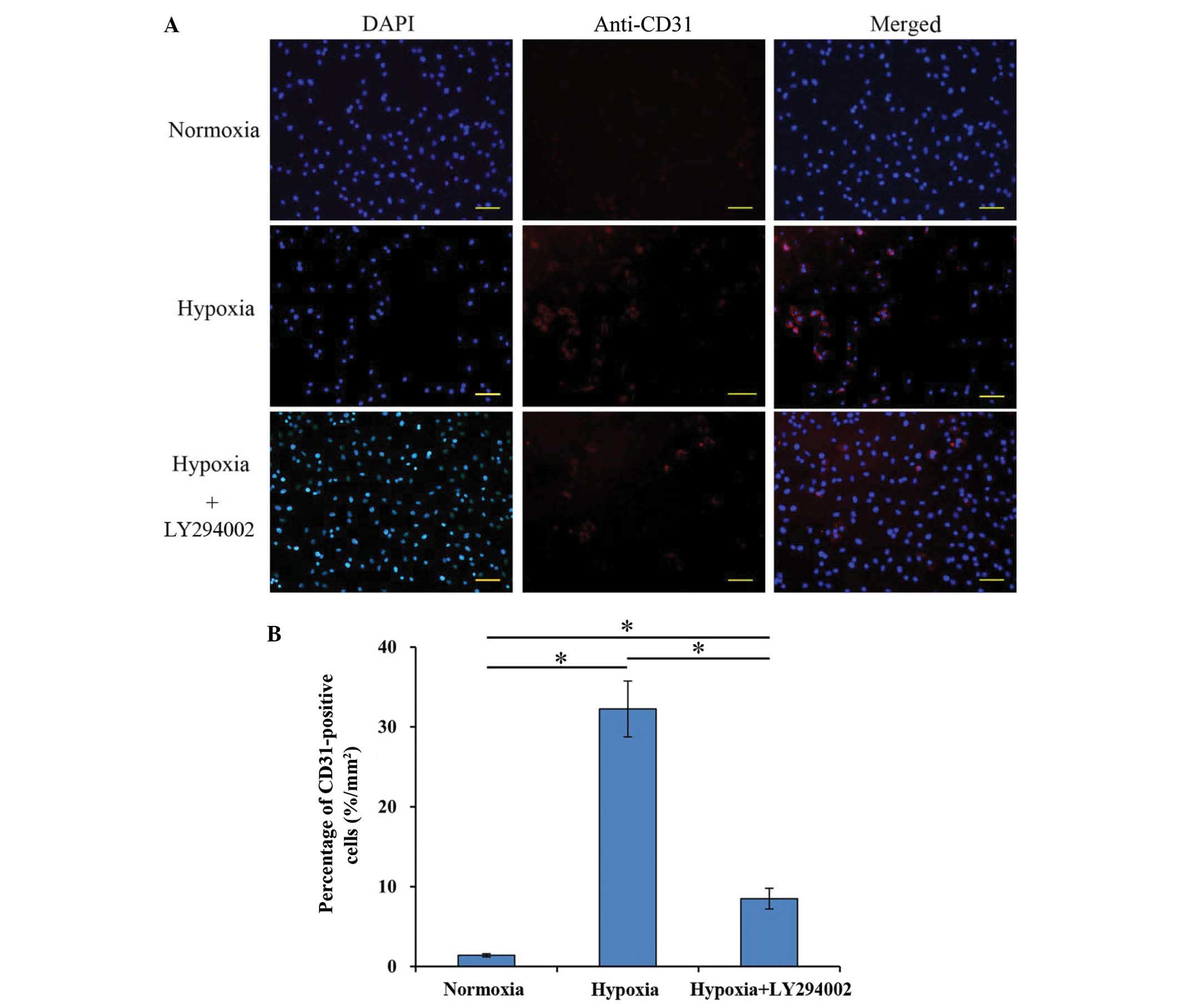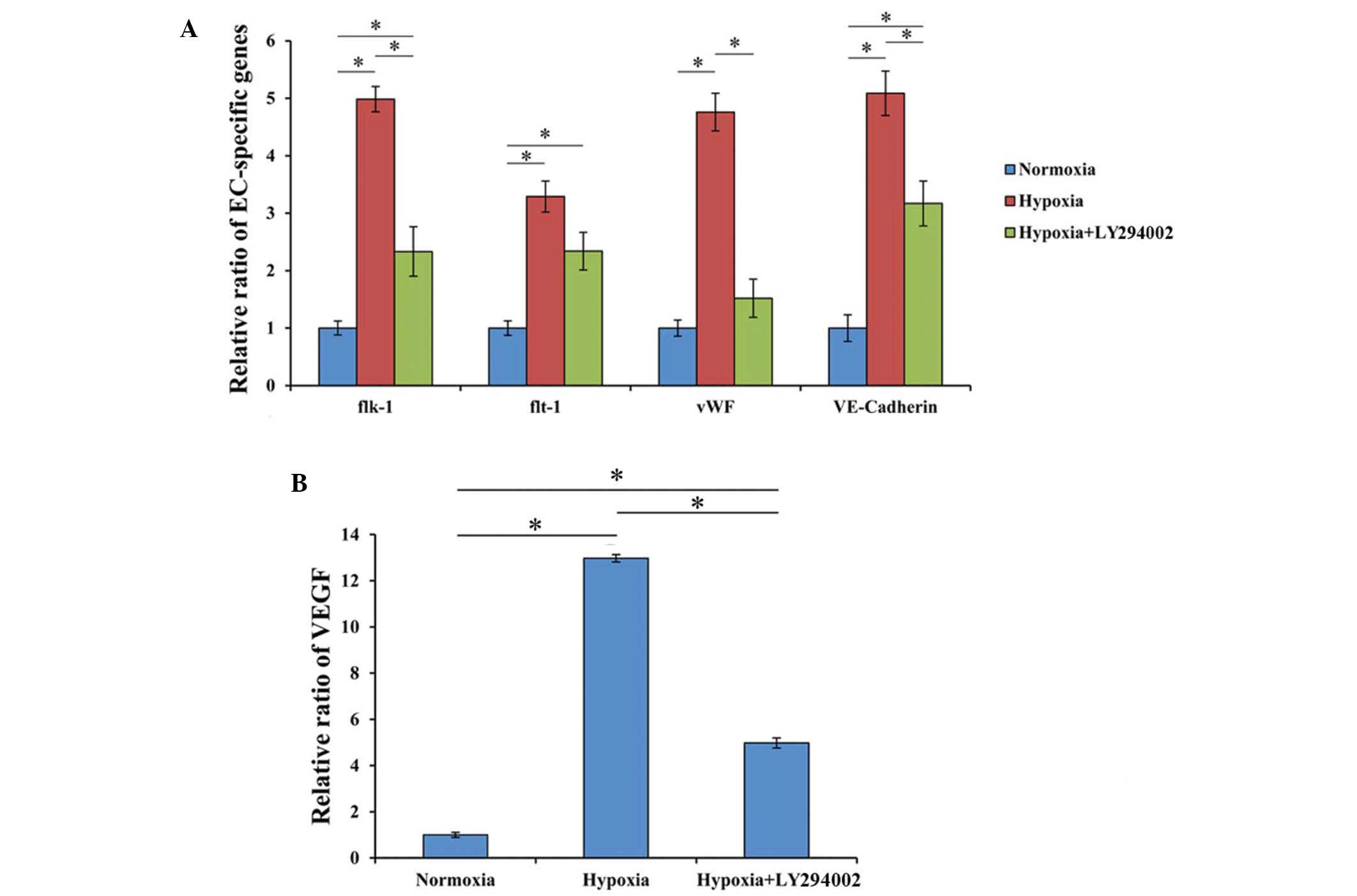|
1
|
Chen J, Li Y, Wang L, Zhang Z, Lu D, Lu M
and Chopp M: Therapeutic benefit of intravenous administration of
bone marrow stromal cells after cerebral ischemia in rats. Stroke.
32:1005–1011. 2001. View Article : Google Scholar : PubMed/NCBI
|
|
2
|
Tse HF, Siu CW, Zhu SG, Songyan L, Zhang
QY, Lai WH, Kwong YL, Nicholls J and Lau CP: Paracrine effects of
direct intramyocardial implantation of bone marrow derived cells to
enhance neovascularization in chronic ischaemic myocardium. Eur J
Heart Fail. 9:747–753. 2007. View Article : Google Scholar : PubMed/NCBI
|
|
3
|
Uysal CA, Ogawa R, Lu F, Hyakusoku H and
Mizuno H: Effect of mesenchymal stem cells on skin graft to flap
prefabrication: An experimental study. Ann Plast Surg. 65:237–244.
2010. View Article : Google Scholar : PubMed/NCBI
|
|
4
|
Cao F, Lin S, Xie X, Ray P, Patel M, Zhang
X, Drukker M, Dylla SJ, Connolly AJ, Chen X, et al: In vivo
visualization of embryonic stem cell survival, proliferation and
migration after cardiac delivery. Circulation. 113:1005–1014. 2006.
View Article : Google Scholar : PubMed/NCBI
|
|
5
|
Horwitz EM, Prockop DJ, Fitzpatrick LA,
Koo WW, Gordon PL, Neel M, Sussman M, Orchard P, Marx JC, Pyeritz
RE and Brenner MK: Transplantability and therapeutic effects of
bone marrow-derived mesenchymal cells in children with osteogenesis
imperfecta. Nat Med. 5:309–313. 1999. View
Article : Google Scholar : PubMed/NCBI
|
|
6
|
Zhu LL, Wu LY, Yew DT and Fan M: Effects
of hypoxia on the proliferation and differentiation of NSCs. Mol
Neurobiol. 31:231–242. 2005. View Article : Google Scholar : PubMed/NCBI
|
|
7
|
Grayson WL, Zhao F, Bunnell B and Ma T:
Hypoxia enhances proliferation and tissue formation of human
mesenchymal stem cells. Biochem Biophys Res Commun. 358:948–953.
2007. View Article : Google Scholar : PubMed/NCBI
|
|
8
|
Ren H, Cao Y, Zhao Q, Li J, Zhou C, Liao
L, Jia M, Zhao Q, Cai H, Han ZC, et al: Proliferation and
differentiation of bone marrow stromal cells under hypoxic
conditions. Biochem Biophys Res Commun. 347:12–21. 2006. View Article : Google Scholar : PubMed/NCBI
|
|
9
|
Chen L, Tredget EE, Wu PY and Wu Y:
Paracrine factors of mesenchymal stem cells recruit macrophages and
endothelial lineage cells and enhance wound healing. PloS One.
3:e18862008. View Article : Google Scholar : PubMed/NCBI
|
|
10
|
Han SK, Chun KW, Gye MS and Kim WK: The
effect of human bone marrow stromal cells and dermal fibroblasts on
angiogenesis. Plast Reconstr Surg. 117:829–835. 2006. View Article : Google Scholar : PubMed/NCBI
|
|
11
|
Mohyeldin A, Garzón-Muvdi T and
Quiñones-Hinojosa A: Oxygen in stem cell biology: A critical
component of the stem cell niche. Cell Stem Cell. 7:150–161. 2010.
View Article : Google Scholar : PubMed/NCBI
|
|
12
|
Yew TL, Chang MC, Hsu YT, He FY, Weng WH,
Tsai CC, Chiu FY and Hung SC: Efficient expansion of mesenchymal
stem cells from mouse bone marrow under hypoxic conditions. J
Tissue Eng Regen Med. 7:984–993. 2013. View Article : Google Scholar : PubMed/NCBI
|
|
13
|
Hung SP, Ho JH, Shih YR, Lo T and Lee OK:
Hypoxia promotes proliferation and osteogenic differentiation
potentials of human mesenchymal stem cells. J Orthop Res.
30:260–266. 2012. View Article : Google Scholar : PubMed/NCBI
|
|
14
|
Cicione C, Muiños-López E, Hermida-Gómez
T, Fuentes-Boquete I, Díaz-Prado S and Blanco FJ: Effects of severe
hypoxia on bone marrow mesenchymal stem cells differentiation
potential. Stem Cells Int. 2013:2328962013. View Article : Google Scholar : PubMed/NCBI
|
|
15
|
Chen L, Xu Y, Zhao J, Zhang Z, Yang R, Xie
J, Liu X and Qi S: Conditioned medium from hypoxic bone
marrow-derived mesenchymal stem cells enhances wound healing in
mice. PLoS One. 9:e961612014. View Article : Google Scholar : PubMed/NCBI
|
|
16
|
Jung F, Haendeler J, Goebel C, Zeiher AM
and Dimmeler S: Growth factor-induced phosphoinositide 3-OH
kinase/Akt phosphorylation in smooth muscle cells: Induction of
cell proliferation and inhibition of cell death. Cardiovasc Res.
48:148–157. 2000. View Article : Google Scholar : PubMed/NCBI
|
|
17
|
Ma J, Sawai H, Ochi N, Matsuo Y, Xu D,
Yasuda A, Takahashi H, Wakasugi T and Takeyama H: PTEN regulates
angiogenesis through PI3K/Akt/VEGF signaling pathway in human
pancreatic cancer cells. Mol Cell Biochem. 331:161–171. 2009.
View Article : Google Scholar : PubMed/NCBI
|
|
18
|
Zhang Z, Zhao C, Liu B, Liang D, Qin X, Li
X, Zhang R, Li C, Wang H, Sun D and Cao F: Inositol pyrophosphates
mediate the effects of aging on bone marrow mesenchymal stem cells
by inhibiting Akt signaling. Stem Cell Res Ther. 5:332014.
View Article : Google Scholar : PubMed/NCBI
|
|
19
|
Zhou N, Lu F, Liu C, Xu K, Huang J, Yu D
and Bi L: IL-8 induces the epithelial-mesenchymal transition of
renal cell carcinoma cells through the activation of AKT signaling.
Oncol Lett. 12:1915–1920. 2016.PubMed/NCBI
|
|
20
|
Huang P, Li Y, Lv Z, Wang J, Zhang Q, Yao
X, Corrigan CJ, Huang K, Wang W and Ying S: Comprehensive
attenuation of IL-25-induced airway hyperresponsiveness,
inflammation and remodelling by the PI3K inhibitor LY294002.
Respirology. 24–Aug;2016.(Epub ahead of print).
|
|
21
|
Tong X and Pelling JC: Targeting the
PI3K/Akt/mTOR axis by apigenin for cancer prevention. Anticancer
Agents Med Chem. 13:971–978. 2013. View Article : Google Scholar : PubMed/NCBI
|
|
22
|
Xiao N, Qi XY, Tang LN, Tan LL, Chen YQ
and Zhao HM: VEGF promotes cardiac stem cells differentiation into
vascular endothelial cells via the PI3K/Akt signaling pathway.
Artif Cells Nanomed Biotechnol. 42:400–405. 2014. View Article : Google Scholar : PubMed/NCBI
|
|
23
|
Livak KJ and Schmittgen TD: Analysis of
relative gene expression data using real-time quantitative PCR and
the 2-ΔΔCt method. Methods. 25:402–408. 2001. View Article : Google Scholar : PubMed/NCBI
|
|
24
|
Chen L, Tao Y and Jiang Y: Apelin
activates the expression of inflammatory cytokines in microglial
BV2 cells via PI-3K/Akt and MEK/Erk pathways. Sci China Life Sci.
58:531–540. 2015. View Article : Google Scholar : PubMed/NCBI
|
|
25
|
Caraci F, Battaglia G, Busceti C, Biagioni
F, Mastroiacovo F, Bosco P, Drago F, Nicoletti F, Sortino MA and
Copani A: TGF-beta 1 protects against Abeta-neurotoxicity via the
phosphatidylinositol-3-kinase pathway. Neurobiol Dis. 30:234–242.
2008. View Article : Google Scholar : PubMed/NCBI
|
|
26
|
Csete M: Oxygen in the cultivation of stem
cells. Ann N Y Acad Sci. 1049:1–8. 2005. View Article : Google Scholar : PubMed/NCBI
|
|
27
|
Watanabe H, Saito H, Ueda J and Evers BM:
Regulation of pancreatic duct cell differentiation by
phosphatidylinositol-3 kinase. Biochem Biophys Res Commun.
370:33–37. 2008. View Article : Google Scholar : PubMed/NCBI
|
|
28
|
Mangi AA, Noiseux N, Kong D, He H, Rezvani
M, Ingwall JS and Dzau VJ: Mesenchymal stem cells modified with Akt
prevent remodeling and restore performance of infarcted hearts. Nat
Med. 9:1195–1201. 2003. View
Article : Google Scholar : PubMed/NCBI
|
|
29
|
Datta SR, Dudek H, Tao X, Masters S, Fu H,
Gotoh Y and Greenberg ME: Akt phosphorylation of BAD couples
survival signals to the cell-intrinsic death machinery. Cell.
91:231–241. 1997. View Article : Google Scholar : PubMed/NCBI
|
|
30
|
Bai HZ, Pollman MJ, Inishi Y and Gibbons
GH: Regulation of vascular smooth muscle cell apoptosis. Modulation
of bad by a phosphatidylinositol 3-kinase-dependent pathway. Circ
Res. 85:229–237. 1999. View Article : Google Scholar : PubMed/NCBI
|
|
31
|
Cardone MH, Roy N, Stennicke HR, Salvesen
GS, Franke TF, Stanbridge E, Frisch S and Reed JC: Regulation of
cell death protease caspase-9 by phosphorylation. Science.
282:1318–1321. 1998. View Article : Google Scholar : PubMed/NCBI
|
|
32
|
Xiao X, Wang W, Liu D, Zhang H, Gao P,
Geng L, Yuan Y, Lu J and Wang Z: The promotion of angiogenesis
induced by three-dimensional porous beta-tricalcium phosphate
scaffold with different interconnection sizes via activation of
PI3K/Akt pathways. Sci Rep. 5:94092015. View Article : Google Scholar : PubMed/NCBI
|
|
33
|
Angoulvant D, Ivanes F, Ferrera R,
Matthews PG, Nataf S and Ovize M: Mesenchymal stem cell conditioned
media attenuates in vitro and ex vivo myocardial reperfusion
injury. J Heart Lung Transplant. 30:95–102. 2011. View Article : Google Scholar : PubMed/NCBI
|
|
34
|
Fox SB, Gatter KC and Harris AL: Tumour
angiogenesis. J Pathol. 179:232–237. 1996. View Article : Google Scholar : PubMed/NCBI
|
|
35
|
Hicklin DJ and Ellis LM: Role of the
vascular endothelial growth factor pathway in tumor growth and
angiogenesis. J Clin Oncol. 23:1011–1027. 2005. View Article : Google Scholar : PubMed/NCBI
|
|
36
|
He H, Zhao ZH, Han FS, Wang XF and Zeng
YJ: Activation of protein kinase C ε enhanced movement ability and
paracrine function of rat bone marrow mesenchymal stem cells partly
at least independent of SDF-1/CXCR4 axis and PI3K/AKT pathway. Int
J Clin Exp Med. 8:188–202. 2015.PubMed/NCBI
|


















